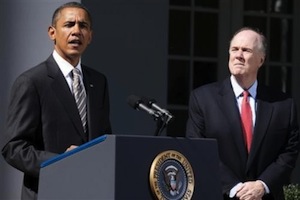National Security Advisor Donilon Calls for Further Nuclear Reductions
Featured Image
Today's top nuclear policy stories, events, and analysis with excerpts in bullet form.
Stories we're following today - Tuesday, April 19, 2011:
Donilon Op-Ed Courts Support for Nuclear Weapons Reduction - Rebecca Kaplan in Global Security Newswire [link]
- Against the backdrop of implementation of the New START treaty with Russia, National Security Adviser Tom Donilon took to the pages of the Financial Times to outline the administration’s plans for nuclear weapons reduction in the future.
- Donilon calls for further reduction of the role and number of U.S. tactical nuclear weapons (done along with Russia), the use of an international fuel bank to prevent the proliferation of nuclear energy, and bringing the Comprehensive Test Ban Treaty into force while seeking to ban production of fissile material for nuclear weapons.
- He also seeks to counter critics who argue that the uprisings in the Middle East increase Iran’s influence in the region. “In a Middle East where more citizens determine their own destiny, Iran will be increasingly isolated by its actions,” he writes.
The New Cold War - Bill Spindle and Margaret Coker in The Wall Street Journal [link]
- For all the attention the Mideast protests have received, their most notable impact on the region thus far hasn't been an upswell of democracy. It has been a dramatic spike in tensions between two geopolitical titans, Iran and Saudi Arabia.
- "The cold war is a reality," says one senior Saudi official. "Iran is looking to expand its influence. This instability over the last few months means that we don't have the luxury of sitting back and watching events unfold."
- The intensified wrangling across the Persian—or, as the Saudis insist, the Arabian—Gulf has strained relations between the U.S. and important Arab allies, helped to push oil prices into triple digits and tempered U.S. support for some of the popular democracy movements in the Arab world
- Growing hostility between the two countries could make it more difficult for the U.S. to exit smoothly from Iraq this year, as planned. And, perhaps most dire, it could exacerbate what many fear is a looming nuclear arms race in the region.
Paul Wants to Cut Military Spending - Politico [link]
- Pentagon spending must be on the chopping block in order to reach a bipartisan deal to rein in the national debt, Sen. Rand Paul (R-Ky.) said Sunday.
- "There is a compromise, but the compromise is not to raise taxes," Paul said. "The compromise is for conservatives to admit that the military budget is going to have to be cut."
- Conservatives will have to compromise, and we will have to cut military spending," he said. "Liberals will have to compromise and will have to cut domestic welfare. The compromise is where to cut not whether to raise taxes."
Pakistani Army Says It Successfully Test-fires Newly Developed Short-range Missile - The Associated Press [link]
- Pakistan’s military says it has test-fired a newly developed short-range missile capable of delivering a nuclear warhead.
- Pakistan routinely test-fires what it claims are indigenously developed short and long-range missiles capable of carrying the country’s nuclear weapons.
- The international community closely watches Pakistan’s weapons program because the nation has fought three wars with its nuclear-armed neighbor, India, since 1947.
N. Korea Ready for Atomic Test Any Time: S. Korea - AFP [link]
- North Korea is ready to conduct another nuclear test if its current approaches for dialogue fail although there are no current signs of preparations, South Korea's spy chief said Tuesday.
- "I believe North Korea will use military action such as nuclear and missile (tests) to turn the tables if its current tack of dialogue fails," [National Intelligence Services chief] Won said.
- The South's Yonhap news agency reported in February that the North was digging at least two new tunnels at its nuclear test site in apparent preparation for a third atomic detonation.
- North Korea conducted its first two nuclear tests in October 2006 and May 2009.
EVENT: Arms Control Association Annual Meeting - Reducing the Nuclear Danger: Next Steps on the Test Ban Treaty and Nuclear Arms Reductions [link]
- Tuesday, May 10, 2011, 9:00 AM - 4:00 PM
- Carnegie Endowment for International Peace, Root Room
- 1779 Massachusetts Ave. NW, Washington, D.C.
A View From the Dark Side
Congress Must Demand Details of New START Implementation - Baker Spring and Michaela Bendikova for The Heritage Foundation [link]
- Congress should demand that the Department of Defense provide it with a report outlining and describing how much the implementation of New START will cost in the course of the coming years.
- New START requires the parties to destroy only the first stages of ICBMs. This will be a costly and labor-intensive process.
- The fiscal year (FY) 2012 defense budget is unclear as to how much the implementation of New START will cost. The only specific numbers pertaining to the treaty implementation are expenses related to training, equipping, organizing, deploying, and exercising operational control over inspection, monitoring, and escort teams for New START on-site inspections.
- In FY 2012, these costs are estimated to be over $8 million.



